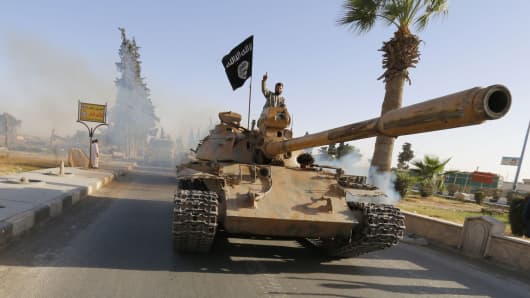President Barack Obama needs help from secular, moderate militias to achieve his goal of degrading and destroying the Islamic State in Iraq and the Levant (ISIL). His strategy can work by enlisting Kurdish fighters as the point of the spear. Declaring an "ISIL no-go zone" on territories in Iraq and Syria under Kurdish control would shrink the space controlled by ISIL. Battlefield victories will also create momentum, encouraging others to join the fight against ISIL.
Obama asked the U.S. Congress for $500 million to train Syrian rebels. The request has merit, but Congress rightly asks: Who are they?
The Free Syrian Army is not a unified force with a central command. Its ties to the Syrian National Council are tenuous. Other militias opposing Syria's President Bashar al-Assad are ideologically divided. Some are nationalists; others are jihadists. Many claim to be independent, but fight alongside ISIL. Weapons provided to the non-ISIL Arab opposition might end up in the hands of ISIL or other Sunni militant groups.
Read MoreOp-ed: Turkey is essential for defeating ISIS
Enhancing the capabilities of Syrian rebels is a tall order. Saudi Arabia recently offered bases for an intensive training effort. Vetting Syrian militias and Iraqi tribesmen will take months. Making Syrian rebels combat ready will take even longer.
The Obama administration should start by expanding security cooperation with the Kurds. Giving Kurds weapons and air support to establish an "ISIL no-go zone" would be a big step toward defeating the terror group.
Kurdish militias called peshmerga — "those who stand before death" — have already shown mettle on the battlefield. Supported by U.S. war planes, peshmerga stopped the onslaught of Islamic State fighters on the outskirts of Erbil. Peshmerga recaptured the Mosul Dam and have launched an offensive to recapture Zumar and other territories seized by ISIL.
Kurdish militias in Syria, the People's Protection Forces (YPG), also have a proven track record in combat. The YPG are disciplined and battle-hardened. It vanquished jihadis from the Syrian border town of Ras al-Ain and other villages claimed by ISIL. It also pushed out government forces from Kobani, Amuda, and Efrin.
Others are joining the YPG. On September 11, YPG and the Free Syrian Army entered into an alliance to fight ISIL and the Syrian army in Kobani and Aleppo. The joint command is called "North Volcano."
Read MoreOp-ed: Anger is not a strategy
Arabs, Assyrians, Christians, and women are also coming on board. Yazidis and members of the Shengal Resistance Units have aligned with the YPG. YPG
They are drawn by the YPG's fighting prowess, as well as its ability to provide security and services.
The YPG has also fought effectively in Iraqi Kurdistan, battling Islamic State fighters on Mount Sinjar. They were joined by PKK fighters and Iraqi Kurdish peshmerga. Kurdish forces broke ISIL's siege and escorted more than 10,000 Yazidis from Mount Sinjar to safety.
The Kurdish Democratic Union Party (PYD), the YPG's political wing, recently declared an Autonomous Kurdish Region in Syria. Turkey opposes the PYD, citing its ideological and strategic links to the PKK. Turkey also opposes direct security cooperation between the YPG and the United States. It fears that weapons provided to the People's Protection Forces could end up with the PKK.
Read MoreLook out, Asian pirates: US set to enter the fight
The PKK has fought Turkish forces to secure greater political and cultural rights for Kurds in Turkey for more than 30 years. Turkish officials still refer to the PKK as "terrorists," even though the PKK announced a ceasefire two years ago, and has been engaged in political talks with the government.
It is important to consider Turkey's sensitivities. However, the U.S. and coalition members cannot walk on egg shells. Defeating ISIL is top priority.
Turkey rejected U.S. appeals to take any operational role against ISIL. It refrained from signing the Jeddah Declaration on Sept. 11 with Secretary of State John Kerry and 10 Arab countries, joining the coalition against ISIL. A Wall Street Journal editorial recently characterized Turkey as a "non-ally," citing comments by former U.S. Ambassador to Turkey Frank Ricciardone.
Read MoreWWII flashback: Is history repeating itself?
The United States has no better friends than the Kurds in Iraq and Syria. Having foresworn U.S. ground forces, Obama can count on the Kurds. Closer cooperation between the U.S. and Kurdish forces may also encourage Turkey to get off the fence and cooperate in the fight with ISIL.
Commentary by David L. Phillips, director of the Program on Peace-building and Human Rights at Columbia University's Institute for the Study of Human Rights. He is a former senior adviser and foreign affairs expert to the U.S. Department of State during the administrations of Presidents Clinton, Bush and Obama.



